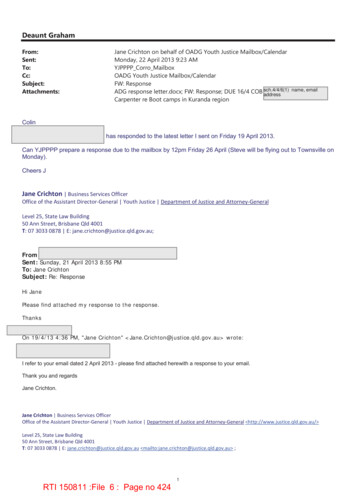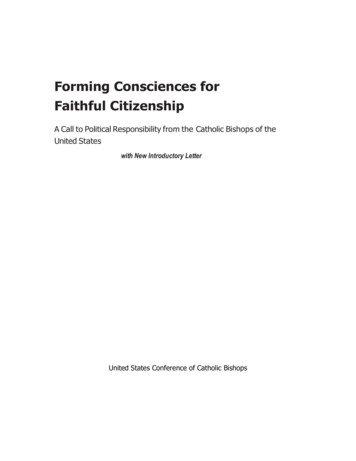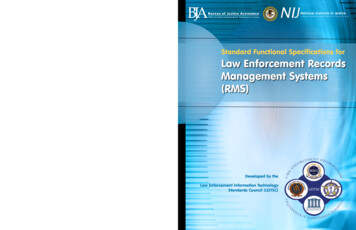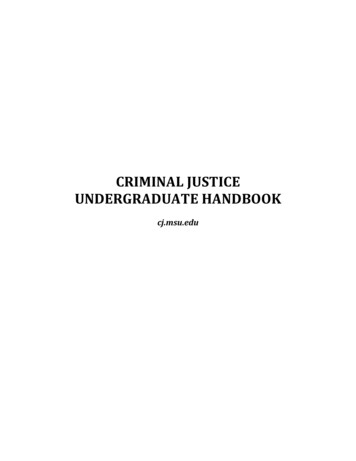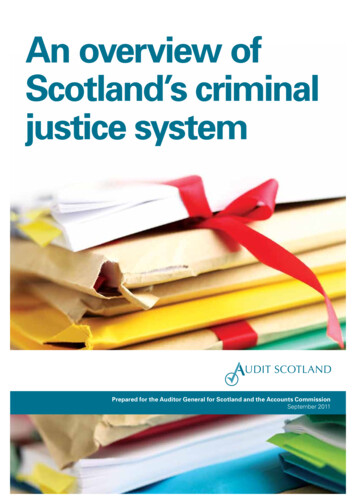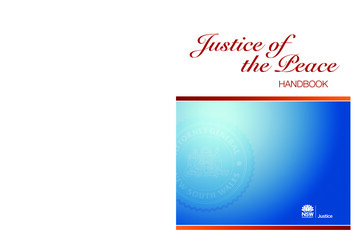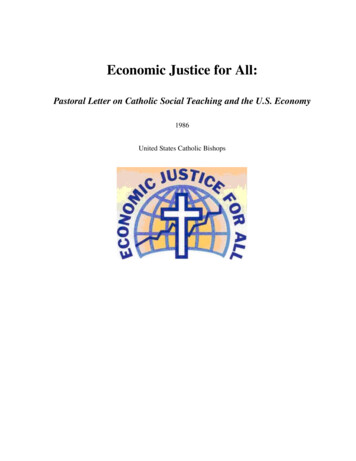
Transcription
Economic Justice for All:Pastoral Letter on Catholic Social Teaching and the U.S. Economy1986United States Catholic Bishops
Economic Justice for All: Pastoral Letter on Catholic Social Teaching and the U.S. EconomyIn November 1986, the National Conference of Catholic Bishops adopted Economic Justice for All: Catholic SocialTeaching and the U.S. Economy. To mark the document’s tenth anniversary, the U.S. Catholic bishops have issued twodocuments. A Decade After “Economic Justice for All”: Continuing Principles, Changing Context, New Challenges,which was approved in November 1995, is a pastoral reflection applying the message of Economic Justice for All to theeconomy of the ‘90s. A Catholic Framework for Economic Life, which was approved in November 1996, outlines tenkey principles of Catholic social teaching on the economy.This anniversary publication, which includes all three documents as well as updated suggestions for action, isauthorized by the undersigned.Monsignor Dennis M. SchnurrGeneral SecretaryNCCB/USCC(1997)Excerpts from The Documents of Vatican II, Walter M. Abbott, SJ, general editor, copyright 1966, America Press,Inc., 106 West 56th Street, New York, NY are reprinted with permission. All rights reserved.Excerpts from Vatican Council II: The Conciliar and Post Conciliar Documents, Austin P. Flannery, ed. (Collegeville,Minn.: Liturgical Press, 1975) are reprinted with permission. All rights reserved.Unless otherwise noted, Old Testament scriptural excerpts are from The New American Bible, copyright 1970,Confraternity of Christian Doctrine, Washington, D.C.; New Testament scriptural excerpts are from The New AmericanBible, copyright 1986, Confraternity of Christian Doctrine, Washington, D.C. Both are used with the permission ofthe copyright owner.Copyright 1997, 2009, United States Conference of Catholic Bishops, Washington, D.C. All rights reserved. No partof this work may be reproduced or transmitted in any form or by any means, electronic or otherwise, includingphotocopying, recording, or by any information storage and retrieval system, without permission in writing from thecopyright holder.iv
Table of ContentsA Pastoral Message: Economic Justice for AllWhy We Write /viPrincipal Themes of the Pastoral Letter /viiA Call to Conversion and Action /ixEconomic Justice for All1Chapter I: The Church and the Future of the U.S. Economy /A. The U.S Economy Today: Memory and Hope /2B. Urgent Problems of Today /3C. The Need for Moral Vision /5Chapter II: The Christian Vision of Economic Life /88A. Biblical Perspectives /B. Ethical Norms for Economic Life/15C. Working for Greater Justice: Persons and Institutions /22D. Christian Hope and the Courage To Act /28Chapter III: Selected Economic Policy Issues/3233A. Employment /B. Poverty /39C. Food and Agriculture /48D. The U.S. Economy and the Developing Nations: Complexity, Challenge and Choices / 54E. Conclusion/6372Chapter IV: A New American Experiment: Partnership for the Common Good /A. Cooperation within Firms and Industries /72/74B. Local and Regional CooperationC. Partnership in the Development of National Policies /75D. Cooperation at the International Level/77/81Chapter V: A Commitment to the FutureA. The Christian Vocation in the World Today /81B. Challenges to the Church /84C. The Road Ahead /8889D. Commitment to a Kingdom of Love and Justice /v
Economic Justice for All: Pastoral Letter on Catholic Social Teaching and the U.S. EconomyA Pastoral MessageEconomic Justice for AllBrothers and Sisters in Christ:1. We are believers called to follow our Lord Jesus Christ and proclaim his Gospel in the midstof a complex and powerful economy. This reality poses both opportunities and responsibilities forCatholics in the United States. Our faith calls us to measure this economy not only by what itproduces, but also by how it touches human life and whether it protects or undermines the dignity ofthe human person. Economic decisions have human consequences and moral content; they help orhurt people, strengthen or weaken family life, advance or diminish the quality of justice in our land.2. This is why we have written Economic Justice for All: A Pastoral Letter on Catholic SocialTeaching and the U.S. Economy. This letter is a personal invitation to Catholics to use the resourcesof our faith, the strength of our economy, and the opportunities of our democracy to shape a societythat better protects the dignity and basic rights of our sisters and brothers, both in this land andaround the world.3. The pastoral letter has been a work of careful inquiry, wide consultation, and prayerfuldiscernment. The letter has been greatly enriched by this process of listening and refinement. Weoffer this introductory pastoral message to Catholics in the United States seeking to live their faithin the marketplace—in homes, offices, factories, and schools; on farms and ranches; in board roomsand union halls; in service agencies and legislative chambers. We seek to explain why we wrote thepastoral letter, to introduce its major themes, and to share our hopes for the dialogue and action itmight generate.Why We Write4. We write to share our teaching, to raise questions, to challenge one another to live our faithin the world. We write as heirs of the biblical prophets who summon us "to do the right and to lovegoodness, and to walk humbly with your God" (Mi 6:8). We write as followers of Jesus who told usin the Sermon on the Mount: "Blessed are the poor in spirit. Blessed are the meek. Blessed arethey who hunger and thirst for righteousness. You are the salt of the earth. You are the light ofthe world" (Mt 5:1-6, 13-14). These words challenge us not only as believers, but also asconsumers, citizens, workers, and owners. In the parable of the Last Judgment, Jesus said, "For Iwas hungry and you gave me food, I was thirsty and you gave me drink. As often as you did it forone of my least brothers, you did it for me" (Mt 25:35-40). The challenge for us is to discover in ourown place and time what it means to be "poor in spirit" and "the salt of the earth" and what it meansto serve "the least among us" and to "hunger and thirst for righteousness."5. Followers of Christ must avoid a tragic separation between faith and everyday life. They canneither shirk their earthly duties nor, as the Second Vatican Council declared, "immerse[them]selves in earthly activities as if these latter were utterly foreign to religion, and religion werenothing more than the fulfillment of acts of worship and the observance of a few moral obligations"(Pastoral Constitution on the Church in the Modern World, no. 43).6. Economic life raises important social and moral questions for each of us and for society as awhole. Like family life, economic life is one of the chief areas where we live out our faith, love ourvi
Economic Justice for All: Pastoral Letter on Catholic Social Teaching and the U.S. Economyneighbor, confront temptation, fulfill God's creative design, and achieve our holiness. Our economicactivity in factory, field, office, or shop feeds our families—or feeds our anxieties. It exercises ourtalents—or wastes them. It raises our hopes—or crushes them. It brings us into cooperation withothers—or sets us at odds. The Second Vatican Council instructs us "to preach the message ofChrist in such a way that the light of the Gospel will shine on all activities of the faithful" (PastoralConstitution, no. 43). In this case, we are trying to look at economic life through the eyes of faith,applying traditional church teaching to the U.S. economy.7. In our letter, we write as pastors, not public officials. We speak as moral teachers, noteconomic technicians. We seek not to make some political or ideological point but to lift up thehuman and ethical dimensions of economic life, aspects too often neglected in public discussion.We bring to this task a dual heritage of Catholic social teaching and traditional American values.8. As Catholics, we are heirs of a long tradition of thought and action on the moral dimensionsof economic activity. The life and words of Jesus and the teaching of his Church call us to servethose in need and to work actively for social and economic justice. As a community of believers, weknow that our faith is tested by the quality of justice among us, that we can best measure our lifetogether by how the poor and the vulnerable are treated. This is not a new concern for us. It is as oldas the Hebrew prophets, as compelling as the Sermon on the Mount, and as current as the powerfulvoice of Pope John Paul II defending the dignity of the human person.9. As Americans, we are grateful for the gift of freedom and committed to the dream of "libertyand justice for all." This nation, blessed with extraordinary resources, has provided anunprecedented standard of living for millions of people. We are proud of the strength, productivity,and creativity of our economy, but we also remember those who have been left behind in ourprogress. We believe that we honor our history best by working for the day when all our sisters andbrothers share adequately in the American dream.10. As bishops, in proclaiming the Gospel for these times we also manage institutions, balancebudgets, and meet payrolls. In this we see the human face of our economy. We feel the hurts andhopes of our people. We feel the pain of our sisters and brothers who are poor, unemployed,homeless, living on the edge. The poor and vulnerable are on our doorsteps, in our parishes, in ourservice agencies, and in our shelters. We see too much hunger and injustice, too much suffering anddespair, both in our own country and around the world.11. As pastors, we also see the decency, generosity and vulnerability of our people. We see thestruggles of ordinary families to make ends meet and provide a better future for their children. Weknow the desire of managers, professionals, and business people to shape what they do by what theybelieve. It is the faith, good will, and generosity of our people that gives us hope as we write thisletter.Principal Themes of the Pastoral Letter12. The pastoral letter is not a blueprint for the American economy. It does not embrace anyparticular theory of how the economy works nor does it attempt to resolve the disputes betweendifferent schools of economic thought. Instead our letter turns to Scripture and to the socialteachings of the Church. There, we discover what our economic life must serve, what standards itmust meet. Let us examine some of these basic moral principles.vii
Economic Justice for All: Pastoral Letter on Catholic Social Teaching and the U.S. Economy13. Every economic decision and institution must be judged in light of whether it protects orundermines the dignity of the human person. The pastoral letter begins with the human person. Webelieve the person is sacred—the clearest reflection of God among us. Human dignity comes fromGod, not from nationality, race, sex, economic status, or any human accomplishment. We judge anyeconomic system by what it does for and to people and by how it permits all to participate in it. Theeconomy should serve people, not the other way around.14. Human dignity can be realized and protected only in community. In our teaching, thehuman person is not only sacred but also social. How we organize our society—in economics andpolitics, in law and policy—directly affects human dignity and the capacity of individuals to growin community. The obligation to "love our neighbor" has an individual dimension, but it alsorequires a broader social commitment to the common good. We have many partial ways to measureand debate the health of our economy: Gross National Product, per capita income, stock marketprices, and so forth. The Christian vision of economic life looks beyond them all and asks, Doeseconomic life enhance or threaten our life together as a community?15. All people have a right to participate in the economic life of society. Basic justice demandsthat people be assured a minimum level of participation in the economy. It is wrong for a person orgroup to be excluded unfairly or to be unable to participate or contribute to the economy. Forexample, people who are both able and willing, but cannot get a job are deprived of the participationthat is so vital to human development. For, it is through employment that most individuals andfamilies meet their material needs, exercise their talents, and have an opportunity to contribute tothe larger community. Such participation has special significance in our tradition because webelieve that it is a means by which we join in carrying forward God's creative activity.16. All members of society have a special obligation to the poor and vulnerable. From theScriptures and church teaching we learn that the justice of a society is tested by the treatment of thepoor. The justice that was the sign of God's covenant with Israel was measured by how the poor andunprotected—the widow, the orphan, and the stranger—were treated. The kingdom that Jesusproclaimed in his word and ministry excludes no one. Throughout Israel's history and in earlyChristianity, the poor are agents of God's transforming power. "The Spirit of the Lord is upon me,therefore he has anointed me. He has sent me to bring glad tidings to the poor" (Lk 4:18). This wasJesus' first public utterance. Jesus takes the side of those most in need. In the Last Judgment, sodramatically described in St. Matthew's Gospel, we are told that we will be judged according to howwe respond to the hungry, the thirsty, the naked, the stranger. As followers of Christ, we arechallenged to make a fundamental "option for the poor"—to speak for the voiceless, to defend thedefenseless, to assess life styles, policies, and social institutions in terms of their impact on the poor.This "option for the poor" does not mean pitting one group against another, but rather, strengtheningthe whole community by assisting those who are most vulnerable. As Christians, we are called torespond to the needs of all our brothers and sisters, but those with the greatest needs require thegreatest response.17. Human rights are the minimum conditions for life in community. In Catholic teaching,human rights include not only civil and political rights but also economic rights. As Pope JohnXXIII declared, “all people have a right to life, food, clothing, shelter, rest, medical care, education,and employment.” This means that when people are without a chance to earn a living, and must gohungry and homeless, they are being denied basic rights. Society must ensure that these rights areprotected. In this way we will ensure that the minimum conditions of economic justice are met forall our sisters and brothers.viii
Economic Justice for All: Pastoral Letter on Catholic Social Teaching and the U.S. Economy18. Society as a whole, acting through public and private institutions, has the moralresponsibility to enhance human dignity and protect human rights. In addition to the clearresponsibility of private institutions, government has an essential responsibility in this area. Thisdoes not mean that government has the primary or exclusive role, but it does have a positive moralresponsibility in safeguarding human rights and ensuring that the minimum conditions of humandignity are met for all. In a democracy, government is a means by which we can act together toprotect what is important to us and to promote our common values.19. These six moral principles are not the only ones presented in the pastoral letter, but theygive an overview of the moral vision that we are trying to share. This vision of economic life cannotexist in a vacuum; it must be translated into concrete measures. Our pastoral letter spells out somespecific applications of Catholic moral principles. We call for a new national commitment to fullemployment. We say it is a social and moral scandal that one of every seven Americans is poor, andwe call for concerted efforts to eradicate poverty. The fulfillment of the basic needs of the poor is ofthe highest priority. We urge that all economic policies be evaluated in light of their impact on thelife and stability of the family. We support measures to halt the loss of family farms and to resist thegrowing concentration in the ownership of agricultural resources. We specify ways in which theUnited States can do far more to relieve the plight of poor nations and assist in their development.We also reaffirm church teaching on the rights of workers, collective bargaining, private property,subsidiarity, and equal opportunity.20. We believe that the recommendations in our letter are reasonable and balanced. Inanalyzing the economy, we reject ideological extremes and start from the fact that ours is a "mixed"economy, the product of a long history of reform and adjustment. We know that some of ourspecific recommendations are controversial. As bishops, we do not claim to make these prudentialjudgments with the same kind of authority that marks our declarations of principle. But we feelobliged to teach by example how Christians can undertake concrete analysis and make specificjudgments on economic issues. The church's teachings cannot be left at the level of appealinggeneralities.21. In the pastoral letter we suggest that the time has come for a "New AmericanExperiment"—to implement economic rights, to broaden the sharing of economic power, and tomake economic decisions more accountable to the common good. This new experiment can createnew structures of economic partnership and participation within firms at the regional level, for thewhole nation, and across borders.22. Of course, there are many aspects of the economy the letter does not touch, and there arebasic questions it leaves to further exploration. There are also many specific points on which menand women of good will may disagree. We look for a fruitful exchange among differing viewpoints.We pray only that all will take to heart the urgency of our concerns; that together we will test ourviews by the Gospel and the Church's teaching; and that we will listen to other voices in a spirit ofmutual respect and open dialogue.A Call to Conversion and Action23. We should not be surprised if we find Catholic social teaching to be demanding. TheGospel is demanding. We are always in need of conversion, of a change of heart. We are richlyblessed, and as St. Paul assures us, we are destined for glory. Yet it is also true that we are sinners;that we are not always wise or loving or just; that, for all our amazing possibilities, we areix
Economic Justice for All: Pastoral Letter on Catholic Social Teaching and the U.S. Economyincompletely born, wary of life, and hemmed in by fears and empty routines. We are unable toentrust ourselves fully to the living God, and so we seek substitute forms of security: in materialthings, in power, in indifference, in popularity, in pleasure. The Scriptures warn us that these thingscan become forms of idolatry. We know that, at times, in order to remain truly a community ofJesus' disciples, we will have to say “no” to certain aspects in our culture, to certain trends and waysof acting that are opposed to a life of faith, love, and justice. Changes in our hearts lead naturally toa desire to change how we act. With what care, human kindness, and justice do I conduct myself atwork? How will my economic decisions to buy, sell, invest, divest, hire, or fire serve human dignityand the common good? In what career can I best exercise my talents so as to fill the world with theSpirit of Christ? How do my economic choices contribute to the strength of my family andcommunity, to the values of my children, to a sensitivity to those in need? In this consumer society,how can I develop a healthy detachment from things and avoid the temptation to assess who I am bywhat I have? How do I strike a balance between labor and leisure that enlarges my capacity forfriendships, for family life, for community? What government policies should I support to attain thewell-being of all, especially the poor and vulnerable?24. The answers to such questions are not always clear—or easy to live out. But, conversion isa lifelong process. And, it is not undertaken alone. It occurs with the support of the whole believingcommunity, through baptism, common prayer, and our daily efforts, large and small, on behalf ofjustice. As a Church, we must be people after God's own heart, bonded by the Spirit, sustaining oneanother in love, setting our hearts on God's kingdom, committing ourselves to solidarity with thosewho suffer, working for peace and justice, acting as a sign of Christ's love and justice in the world.The Church cannot redeem the world from the deadening effects of sin and injustice unless it isworking to remove sin and injustice in its own life and institutions. All of us must help the Churchto practice in its own life what it preaches to others about economic justice and cooperation.25. The challenge of this pastoral letter is not merely to think differently, but also to actdifferently. A renewal of economic life depends on the conscious choices and commitments ofindividual believers who practice their faith in the world. The road to holiness for most of us lies inour secular vocations. We need a spirituality which calls forth and supports lay initiative andwitness not just in our churches but also in business, in the labor movement, in the professions, ineducation, and in public life. Our faith is not just a weekend obligation, a mystery to be celebratedaround the altar on Sunday. It is a pervasive reality to be practiced every day in homes, offices,factories, schools, and businesses across our land. We cannot separate what we believe from howwe act in the marketplace and the broader community, for this is where we make our primarycontribution to the pursuit of economic justice.26. We ask each of you to read the pastoral letter, to study it, to pray about it, and match it withyour own experience. We ask you to join with us in service to those in need. Let us reach outpersonally to the hungry and the homeless, to the poor and the powerless, and to the troubled andthe vulnerable. In serving them, we serve Christ. Our service efforts cannot substitute for just andcompassionate public policies, but they can help us practice what we preach about human life andhuman dignity.27. The pursuit of economic justice takes believers into the public arena, testing the policies ofgovernment by the principles of our teaching. We ask you to become more informed and activecitizens, using your voices and votes to speak for the voiceless, to defend the poor and thevulnerable, and to advance the common good. We are called to shape a constituency of conscience,x
Economic Justice for All: Pastoral Letter on Catholic Social Teaching and the U.S. Economymeasuring every policy by how it touches the least, the lost, and the left-out among us. This lettercalls us to conversion and common action, to new forms of stewardship, service, and citizenship.28. The completion of a letter such as this is but the beginning of a long process of education,discussion, and action. By faith and baptism, we are fashioned into new creatures, filled with theHoly Spirit and with a love that compels us to seek out a new profound relationship with God, withthe human family, and with all created things. Jesus has entered our history as God's anointed sonwho announces the coming of God's kingdom, a kingdom of justice and peace and freedom. And,what Jesus proclaims, he embodies in his actions. His ministry reveals that the reign of God issomething more powerful than evil, injustice, and the hardness of hearts. Through his crucifixionand resurrection, he reveals that God's love is ultimately victorious over all suffering, all horror, allmeaninglessness, and even over the mystery of death. Thus, we proclaim words of hope andassurance to all who suffer and are in need.29. We believe that the Christian view of life, including economic life, can transform the livesof individuals, families, schools, and our whole culture. We believe that with your prayers,reflection, service, and action, our economy can be shaped so that human dignity prospers and thehuman person is served. This is the unfinished work of our nation. This is the challenge of our faith.xi
The Church And The Future Of The U.S. EconomyCHAPTER 1THE CHURCH AND THE FUTURE OF THE U.S. ECONOMY1. Every perspective on economic life that is human, moral, and Christian must be shaped bythree questions: What does the economy do for people? What does it do to people? And how dopeople participate in it? The economy is a human reality: men and women working together todevelop and care for the whole of God's creation. All this work must serve the material and spiritualwell-being of people. It influences what people hope for themselves and their loved ones. It affectsthe way they act together in society. It influences their very faith in God.(1)2. The Second Vatican Council declared that "the joys and hopes, the griefs and anxieties of thepeople of this age, especially those who are poor or in any way afflicted, these too are the joys andhopes, the griefs and anxieties of the followers of Christ."(2) There are many signs of hope in U.S.economic life today: Many fathers and mothers skillfully balance the arduous responsibilities of work and familylife. There are parents who pursue a purposeful and modest way of life and by their exampleencourage their children to follow a similar path. A large number of women and men,drawing on their religious tradition, recognize the challenging vocation of family life andchild rearing in a culture that emphasizes material display and self-gratification. Conscientious business people seek new and more equitable ways to organize resources andthe workplace. They face hard choices over expanding or retrenching, shifting investments,hiring or firing. Young people choosing their life's work ask whether success and security are compatiblewith service to others. Workers whose labor may be toilsome or repetitive try daily to ennoble their work with aspirit of solidarity and friendship. New immigrants brave dislocations while hoping for the opportunities realized by themillions who came before them.3. These signs of hope are not the whole story. There have been failures—some of themmassive and ugly: Poor and homeless people sleep in community shelters and in our church basements; thehungry line up in soup lines. Unemployment gnaws at the self-respect of both middle-aged persons who have lost jobsand the young who cannot find them. Hard-working men and women wonder if the system of enterprise that helped themyesterday might destroy their jobs and their communities tomorrow. Families confront major new challenges: dwindling social supports for family stability;economic pressures that force both parents of young children to work outside the home; adriven pace of life among the successful that can sap love and commitment; lack of hope1
Economic Justice for All: Pastoral Letter on Catholic Social Teaching and the U.S. Economyamong those who have less or nothing at all. Very different kinds of families bear differentburdens of our economic system. Farmers face the loss of their land and way of life; young people find it difficult to choosefarming as a vocation; farming communities are threatened; migrant farm workers breaktheir backs in serf-like conditions for disgracefully low wages.4. And beyond our own shores, the reality of 800 million people living in absolute poverty and450 million malnourished or facing starvation casts an ominous shadow over all these hopes andproblems at home.5. Anyone who sees all this will understand our concern as pastors and bishops. People shapethe economy and in turn are shaped by it. Economic arrangements can be sources of fulfillment, ofhope, of community—or of frustration, isolation, and even despair. They teach virtues—or vices—and day by day help mold our characters. They affect the quality of people's lives; at the extremeeven determining whether people live or die. Serious economic choices go beyond purely technicalissues to fundamental questions of value and human purpose.(3) We believe that in facing thesequestions the Christian religious and moral tradition can make an important contribution.A. The U.S. Economy Today: Memory and Hope6. The United States is among the most economically powerful nations on earth. In its shorthistory the U.S. economy has grown to provide an unprecedented standard of living for most of itspeople. The nation has created productive work for millions of immigrants and enabled them tobroaden their freedoms, improve their families' quality of life, and contribute to the building of agreat nation. Those who came to this country from other lands often understood their new lives inthe light of biblical faith. They thought of themselves as entering a promised land of politicalfreedom and economic opportunity. The United States is a land of vast natural resources and fertilesoil. It has encouraged citizens to undertake bold ventures. Through hard work, self-sacrifice andcooperation, families have flourished; towns, cities and a powerful nation have been created.7. But we should recall this history with sober humility. The American experiment in social,political, and economic life has involved serious conflict and suffering. Our nation was born in theface of injustice to native Americans, and its independence was paid for with the blood ofrevolution. Slavery stained the commercial life of the land through its first 250 years and was endedonly by a violent civil war. The establishment of women's suffrage, the protection of industrialworkers, the elimination of child labor, the response to the Great Depression of the 1930s, and thecivil rights movement of the 1960s all involved a sustained st
as the Hebrew prophets, as compelling as the Sermon on the Mount, and as current as the powerful voice of Pope John Paul II defending the dignity of the human person. 9. As . Americans, we are grateful for the gift of freedom and committed to the dream of "liberty and justice for all." T

